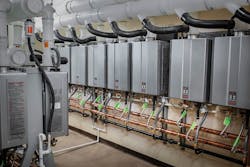Building the Case for Propane: Low-GHG Upgrades for an Energy Efficient Facility
As the commercial construction industry continues to push toward more sustainability and fight climate change, it’s more important than ever to power buildings and developments with clean energy sources like propane.
Powering critical systems and appliances with propane can help maximize efficiency and cost savings while reducing a building’s carbon footprint. Propane’s versatility extends to a wide variety of applications including water heaters, furnaces, ranges and ovens, fireplaces, and standby generators.
While there’s been significant hype about the presumed sustainability of electric systems and appliances, it’s important to remember that there are other ways for a building to approach zero net energy levels.
Propane offers a low-emissions energy solution, producing approximately 43 percent fewer greenhouse gas emissions than using an equivalent amount of electricity generated from the U.S. grid, according to the Propane Education & Research Council (PERC). That is because roughly 60 percent of the energy consumed in U.S. power plants is lost before it gets to the building, either in production, transmission, or transformation losses.
Furnaces
Propane furnaces offer great flexibility in both the type and capacity of the equipment, making them a good fit for many different commercial buildings. With capacity from 44,000 Btu/h up to more than 1 million Btu/h and efficiency levels of 80 to 98.5 percent, these furnaces can meet very specific commercial demands.
Lower-capacity propane furnaces can even qualify for an Energy Star label, which translates to energy savings of 20 percent or more on energy costs over a standard furnace. In addition to high-efficiency equipment, properly sized furnaces and RTUs help optimize efficiency by reducing energy costs and increasing the equipment’s longevity.
Boilers
Propane boilers add value to commercial buildings by serving both space heating and water heating applications with high-efficiency levels, reliability, and versatility. With space heating capacities of up to 8,660,000 Btu/h, they can support many applications.
Some propane boilers are Energy Star qualified and have AFUE ratings of 90 percent or higher, making them at least 11 percent more efficient than minimum-efficiency models. Further, propane boilers qualifying for Energy Star’s Most Efficient label—an AFUE rating of 95 or greater—and can save over 15 percent on energy costs over a minimum-efficiency boiler.
Propane boilers provide high volumes of hot water for domestic consumption as well as related applications like laundry, often with the same boiler that provides space heating.
Related stories
The Rise of Clean Microgrids utilizing Propane
Bacardi Rum Distillery in Puerto Rico cutting emissions by shifting from Fuel Oil to Propane
Subscribe to our free, tri-weekly newsletter for more stories on the C&I Energy Transition
Water heaters
Effective in both new commercial projects and as replacements in existing buildings, high-efficiency propane water heaters—both storage tank and tankless models—offer versatile, efficient, high-performance solutions for many commercial applications.
Propane storage tank water heaters have efficiency features such as added insulation to reduce heat loss from the stored water and electronic ignition to eliminate the fuel consumption of a standing pilot light. Some units also have increased burner surface area to optimize heat transfer and overall efficiency. Additionally, propane storage tank water heaters have capacities of often 100 gallons or more, along with the ability to heat water up to 180 degrees Fahrenheit.
Propane tankless water heaters, save valuable square footage within commercial buildings with their compact, space-saving design. Not only do they offer efficiency levels of up to 98 percent, but they also deliver endless, on-demand hot water and have a life cycle up to 20 years, strengthening their value proposition in commercial applications.
Despite their higher initial cost, propane tankless water heaters can offer attractive paybacks, better reliability, and long-term energy savings. In high-demand commercial applications, such as hotels, restaurants, or hospitals, where high flow rates and/or high temperatures are crucial, banking multiple tankless units together in larger groups provides a high value design solution.
Cooking equipment
Superior temperature control, instant-on burners, greater heating capacity levels, even heat distribution, and design flexibility are a few reasons why 96 percent of professional chefs prefer cooking exclusively with gas over electric models. Delivering professional-grade performance while decreasing fuel consumption, propane cooking equipment provides convenience and functionality in any commercial kitchen.
To manage costs, owners and designers can utilize Energy Star-labeled cooking appliances. Energy Star criteria establishes minimum levels for how much energy is delivered to the cooking process, as well as the energy consumption rate during idle mode.
Clothes dryers
Commercial propane clothes dryers provide laundry functions for numerous building types, with a range of capacities and performance options to meet specific needs. Burner capacities generally range from 18,000 Btu/h to well over 550,000 Btu/h. Propane dryers outperform their electric counterparts by providing faster drying times. In addition, many propane models feature perforated drums for more balanced air flow, recirculating air design for energy savings, and numerous other technologies for improved performance and efficiency.
Generators
Commercial propane generators provide supplemental power for a building’s electrical loads when the electric grid is interrupted. They are typically installed as fully automated systems that ramp up quickly for almost immediate power and hands-off operation with capacities ranging from 5 to 400 kW.
Propane’s indefinite shelf life makes it an ideal fuel for generators, not to mention, propane-powered generators offer clear advantages when considering fuel storage, fuel maintenance, and reliability.
As states and municipalities adopt more demanding emissions standards, the value of clean propane will become more important than ever. Propane is the best choice construction professionals can make to help businesses, schools, and other properties reduce their emissions without sacrificing the performance they need.
For more information about how commercial propane applications increase a building’s energy efficiency, visit Propane.com/Commercial.
Bryan Cordill is the director of residential and commercial business development at the Propane Education & Research Council. He can be reached at [email protected].
About the Author
Bryan Cordill, Propane Education and Research Council
Bryan Cordill is the director of residential and commercial business development at the Propane Education & Research Council. He can be reached at [email protected].
About EnergyTech: Our target audience includes energy managers, plant managers and chief sustainability officers working for large electricity users (Fortune 1000 companies), such as industrial manufacturing, refineries, commercial and industrial building owners, schools and universities, government entities, municipalities, data centers. These individuals are working to implement sustainable technologies like energy storage, renewables, microgrids and electrification. In addition, the audience includes energy efficiency equipment OEMs and energy efficiency consultants.

